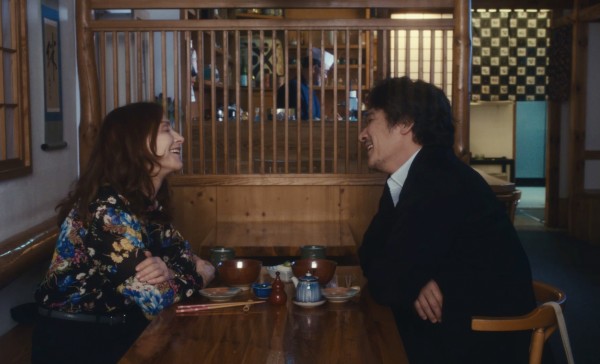While in Japan, a well-known French writer, Sidonie Percival, interacts with her late husband’s ghost, and with help and understanding she re-connects emotionally with those around her.
SIDONIE AU JAPON (Sidonie in Japan). Starring: Isabelle Huppert, Tsuyoshi Ihara, and August Diehl. Directed by Elise Girard. Rated PG (Mild themes and sexual references). 96 min.
Review by Peter W Sheehan, Jesuit Media Australia
This international drama film was photographed in Japan, and is co-written by Director, Elise Girard and Sophie Fillieres. It tells the story of a grieving French writer, Sidonie Perceval (Isabelle Huppert), who has recently lost her husband Antoine (August Diehi) in tragic circumstances.

Sidonie goes to Japan for the re-release of a best-selling book she has written. In Japan, she is accompanied by her local editor, Japanese male publisher, Kenzo Mizoguchi (Tsuyoshi Ihara). She desperately wants to connect with parts of her life she thought she had lost, but in Japan her life is upended when she unexpectedly sees the husband she lost, Antoine. The connection with his ghost challenges her way of life, her strategies for coping with unbearable grief, and her personal identity. Her life is additionally complicated by the attachment she is beginning to form with Kenzo. Antoine’s ghost becomes an integral part of the drama that unfolds.
The film gently explores the grief of a woman who is trying to forge a life out of solitude. This is a deeply introspective film of an author who has been affected by personal tragedy. Sidonie was recovering from a car accident that took the life of her brother and parents, and she threw herself into writing as a way of escaping from grief; Antoine was then taken from her in similar circumstances, and she is distraught once more. Knowing she is vulnerable, Sidonie agrees to re-publish her first novel, and slowly begins to heal: “Writing is what’s left when you find yourself with nothing”, she says, and this becomes her chosen path to recovery. Her interaction with Kenzo emphasises cultural differences that relieve her anxieties, and Huppert’s performance as Sidonie augments a richly contemplative film.


Director, Elise Girard, guides her movie insightfully to stress the poetic power of the film’s overarching narrative, and she deftly explores the interaction between culture and grief. Girard targets solitude, and cultural contrasts become the mirror for Sidonie’s emotional journey. As Sidonie opens up to Kenzo, the ghost of her husband finally goes.
This is a highly meditative, gentle, slow-moving film that makes excellent use of the talents of Isabelle Huppert. Girard directs Huppert with understanding and subtlety. Antoine’s ghost is an unusual device that she employs to show a talented person’s path out of grieving and solitude.
Peter W Sheehan is an Associate of Jesuit Media


